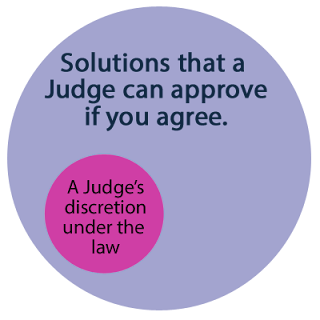Unfortunately, many people end up feeling that the resolutions crafted by Judges are unfair, even when they "won" the case. The reason court solutions often feel unfair is because they are limited to the statutes and case law. Judge's don't have unlimited discretion (or time) to find the best solution for a family. They have to find the solution that is least offensive within the boundaries of the law.
When people choose an out-of-court settlement option, like mediation or collaborative negotiation, one of the advantages is that they don't have to accept the limitations of court crafted solutions. I often draw the below diagram for my mediation clients to help illustrate this point:
The blue circle contains all the solutions that a Judge can approve. You can't go outside the blue circle because there are still limitations on what the Judge can approve, for example a Judge can't approve an agreement that violates tax laws. However, the world of solutions that exist in the blue circle is still much, much larger than the solutions that a Judge must choose from if you disagree (the pink circle).
While you might reach agreements that a Judge would have ordered anyway, wouldn't you want the opportunity to consider more possibilities and not limit yourself? Mediation, Collaborative Law and other out-of-court settlement processes offer you that choice, and when you realize all the possibilities, court doesn't seem like much of a choice at all.

 Skylark.law
Skylark.law

Comments
Post a Comment